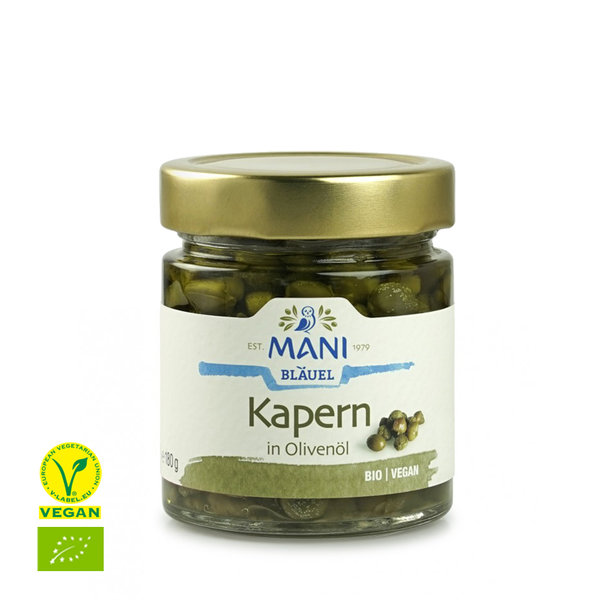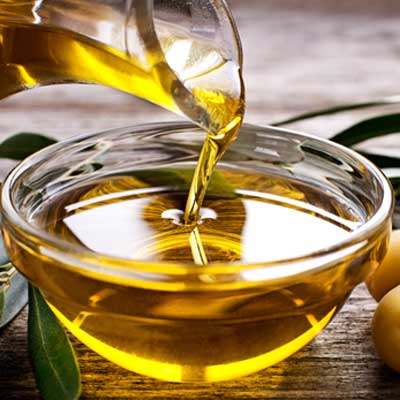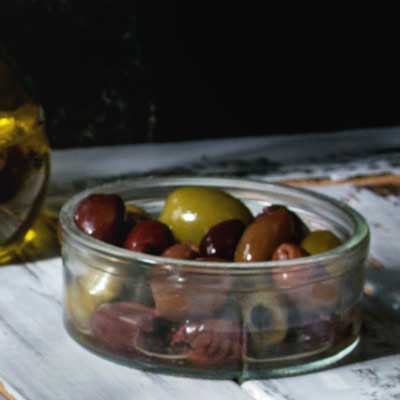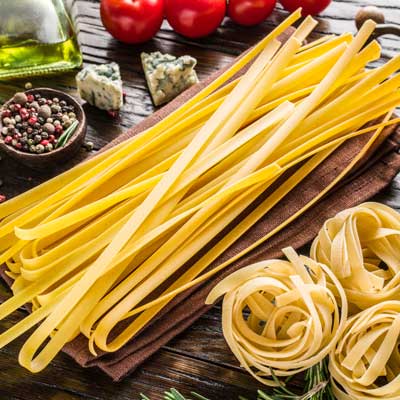♥ 100% organic & vegan
✓ preserved in extra virgin organic olive oil from Greece
☀ spicy & flavoursome
BBD: 18.09.2026
Organic capers in Mani organic olive oil
capers are aromatic and fruity and a real enrichment for Mediterranean cuisine. The capers from Mani Bläuel are preserved in high-quality organic olive oil from Greece. This makes the capers not as salty as capers that are only preserved in brine. Capers are particularly popular in dishes such as vitello tonnato, puttanesca sauce, tartar sauce and salade niçoise. But capers can also be found in German and East Prussian cuisine. For example, in the traditional Königsberger Klopse (meatballs) with caper sauce. Capers are a popular ingredient because they give dishes an intense, spicy flavour and a pleasant salty note.
Buy capers in olive oil
Capers are the insider tip of Mediterranean cuisine. Because it does not take much of the spicy flower buds to give dishes a savoury and salty touch. For example, a simple tomato sauce becomes a spicy aromatic delight with the addition of capers. With capers, size is particularly important, because here the rule is: the smaller, the better.
The flower buds of the caper plant, which is native to southern Europe and the entire Mediterranean region, are first dried briefly after the laborious harvest by hand and then placed in brine. At Mani Bläuel, the organic capers are first washed after the brining time and then placed in organic olive oil, a little wine vinegar and citric acid. This is how Mani capers get their wonderful flavour and are perfectly preserved and stored.
Our storage tip: organic capers in a jar should always be covered with oil and stored in a cool place protected from light. This can significantly extend their shelf life.
Ingredients: capers* (65%) (origin: Turkey), extra virgin olive oil* (34.5%), sea salt, wine vinegar*, citric acid
*From certified organic production. (GR-BIO-03)
Nährwerte / Nutrition Facts
auf / per 100 g / ml
Energie / Energy 1324kJ / 316 kcal
Fat / Total Fat 33.4 g
of which saturated fats / of which: saturated fats 5.0 g
monounsaturated fat / monounsaturated fat 26.0 g
polyunsaturated fat / polyunsaturated fat 2.4 g
Carbohydrate / Carbohydrate 2.3 g
of which sugars 0.0 g
Fibre 2.2 g
Protein 1.3 g
Salt 3.1 g
What are capers?
Capers are small, pickled flower buds of the caper bush (Capparis spinosa). The caper bush is a plant species found in various regions of the world, including the Mediterranean, parts of Asia and some parts of North America.
Harvesting capers requires special attention. It is a laborious task, involving the individual picking of flower buds by hand in spring. The key factor here is timing: the buds should still be firm, closed and as small as possible, as they have their most intense flavour at this stage.
What happens after harvesting?
Capers cannot be eaten raw. After harvesting, capers must dry for at least one day and then be placed in a brine or a mixture of brine and vinegar.
Are capers healthy?
Capers consist mostly of water and are rich in vitamins and minerals. Capers are rich in magnesium, calcium, vitamin C, zinc and iron. Our advice: To prevent the ingredients from being lost during cooking, it is recommended to always add capers at the end of the cooking time.
What do capers go well with?
Mediterranean dishes are particularly well known to contain capers. For example, Italian classics such as Vitello tonnato (veal cooked in vegetable broth and white wine, cut into thin slices and poured with a cold tuna caper sauce) or Spaghetti alla puttanesca (spaghetti with a spicy caper-anchovy-tomato sauce). Capers go particularly well with fish (tuna, cod or anchovies). But they also complement wonderful sauces such as homemade tartar sauce or yoghurt dips. Our tip: (spicy yoghurt dip with capers – mix Greek yoghurt with lime juice, add capers and season with salt, pepper and a little sugar). In general, the aromatic buds go well with dishes such as tapenades, pestos and salads, but also with pizza, fish and tomato sauces.
Do you have any questions on this item?










